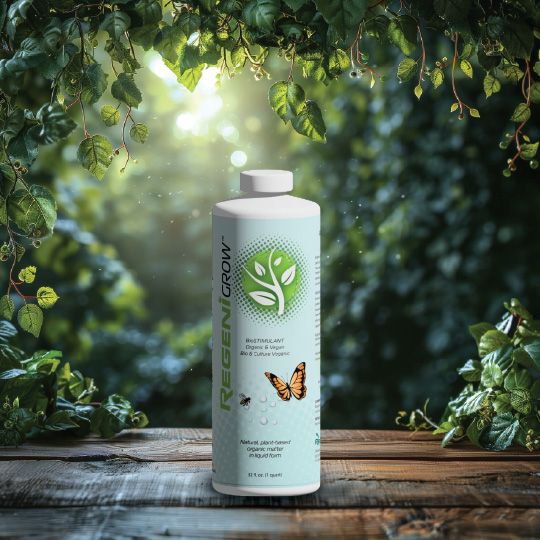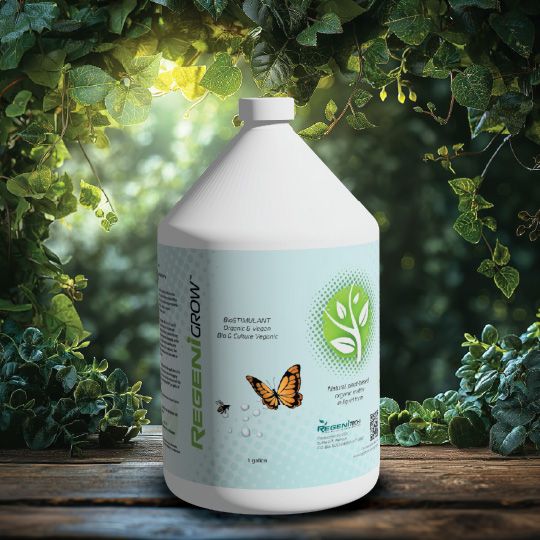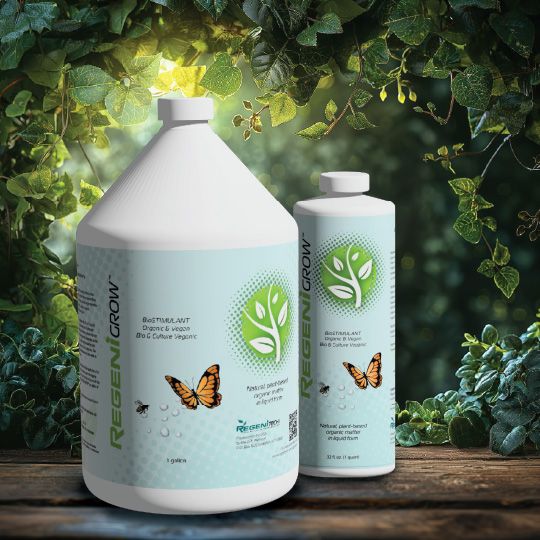REGENiGROW™ Biostimulants are derived from microalgae and microfine particles of biochar processed through REGENiTECH's unique bioreactor sequence. Through this process, the protein-rich microalgae are transformed into an array of amino acids, vitamins, and humic substances. The humics act as a transport mechanism to directly carry the amino acids into the plant metabolic system. The combination of the biochar and biostimulants has also demonstrated a significant effect on stimulating the rapid growth of beneficial soil microorganisms.
The amino acids in REGENiGROW™ significantly impact plant growth by serving as building blocks for proteins, which are essential for cell development and function. They can also act as signaling molecules to stimulate various physiological processes like photosynthesis, chlorophyll production, and stress tolerance.
Some key points about amino acids and plant growth:
- Protein synthesis: The primary function of amino acids is to serve as the building blocks for proteins, which are crucial for all aspects of plant growth, including cell division, root development, and leaf expansion.
- Stress tolerance: Certain amino acids, like proline, can accumulate in plants under stress conditions like drought or salinity, acting as a protective mechanism against damage.
- Hormone precursors: Some amino acids can act as precursors for plant hormones like auxin (indole-3-acetic acid), which plays a critical role in cell elongation and growth.
- Enhanced nutrient uptake: Applying amino acids to plants can improve the absorption of other essential nutrients from the soil.
- Photosynthesis stimulation: Amino acids can positively influence chlorophyll production, leading to increased photosynthetic activity and improved plant vigor.
How REGENiGROW™ Biostimulants can be applied to plants:
- Foliar application: Spraying dilute REGENiGROW™ directly on plant leaves is a common method to deliver these nutrients. Soil application: REGENiGROW™ can also be added to the soil to enhance root development and nutrient uptake.
- Important considerations: Specific amino acid needs: Different plant species may have varying requirements for specific amino acids depending on their growth stage and environmental conditions. It is best to start with lower dilution ratios ( 3% ) then increase to ( 6% ) as indicated by the behavior of the plant.
- Application timing: Applying REGENiGROW™ at critical growth stages, like flowering or fruiting, can maximize their positive impact. Some tests have shown that lower dilution ratios can have a greater impact on flowering or fruiting while higher concentrations can increase the amount of vegetation.
As a REGENiGROW™ user, we invite you to share your experience with us so that we may improve the knowledge base of how plant-based biostimulants can be used effectively to replace harmful chemical fertilizers and pesticides. Send us a note at [email protected].
What are biostimulants?
The term “biostimulant” is defined in the 2018 Farm Bill as “a substance or microorganism that, when applied to seeds, plants, or the rhizosphere, stimulates natural processes to enhance or benefit nutrient uptake, nutrient use efficiency, tolerance to abiotic stress, or crop quality and yield.”
From REGENiTECH's perspective, certain types of biostimulants can support the growth of microorganisms in the soil that work symbiotically with plants or crops. Some of our tests have confirmed that REGENiGROW™ Biostimulants can increase soil microorganisms by several orders of magnitude under the right conditions. If you’re not a scientist, just know—this is significant!
Biostimulants vs. Bio-fertilizers
It's important not to confuse biostimulants with bio-fertilizers, as their functions differ. Our REGENiGROW™ Biostimulant is derived from a combination of microalgae (various species of cyanobacteria) and biochar. Microalgae can produce proteins using raw materials from the atmosphere, aided by micronutrients in the water. Through a bacterial process called biogenesis, microfine biochar particles are combined with microalgae, yielding liquids and solids that plants easily absorb through roots, stems, and leaves. REGENiGROW™ has a pH of 6.5 to 7.
REGENiGROW™ has been successfully used in hydroponic, aquaponic (fish-safe!), and traditional horticulture applications. It has shown excellent results in dry-farming industrial hemp and other crops.
Application Tips
When using REGENiGROW™ as a foliar spray, filter it through cloth or paper towels to prevent clogging your sprayer, as it contains biochar and organic solids. You can add the solids to your compost or back into the soil to benefit the soil microbiome.
For soil drenching, include the solids to support microbial growth. Third-party tests show that REGENiGROW™ can increase soil microorganisms by 20 times over two months. Additionally, it has been effective in reducing soil contamination by combining it with cover crops, showing a 78% reduction in harmful herbicides in contaminated soils.
Get Started with REGENiGROW™
We recommend starting with one quart and experimenting with different applications. Growers have used it to enhance compost breakdown, revive houseplants, and improve the health of medicinal plants and herbs, including increased terpene levels responsible for aroma and flavor. Plants treated with REGENiGROW™ may also show greater resistance to environmental stress factors like heat, cold, and pests, and some may use water more efficiently, so be careful not to overwater.
REGENiGROW™ can be used as both a soil drench and a foliar spray. For both methods, use the same dilution ratios. If applying as a foliar spray, filter the liquid to prevent clogging and reuse the solids in compost or soil. Regular use can follow a lighter concentration, while a heavier concentration can be used for less frequent applications.
For larger quantities or specific applications like organic farming or landscaping, leave your contact information with us here contact us.


